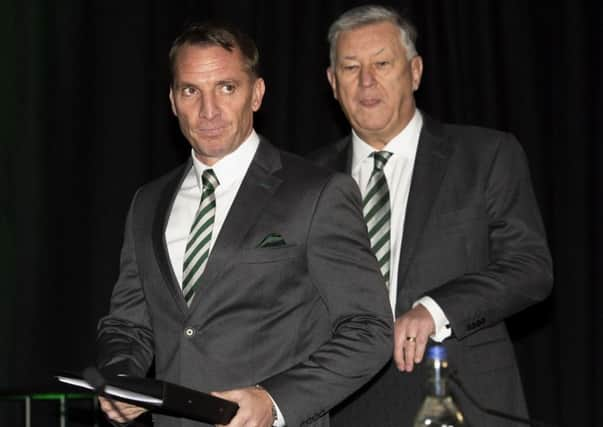Celtic transfer policy is little help to Brendan Rodgers in short-term


He spoke passionately of his desire to establish Celtic as consistent qualifiers for the last 16 of the Champions League within three years, a vision which struck a chord with every Parkhead punter.
It was surely also music to the ears of major shareholder Dermot Desmond and his fellow directors who had shelled out the biggest managerial salary in the club’s history to recruit the former Liverpool boss.
Advertisement
Hide AdAdvertisement
Hide AdHalfway through his third season in charge of the Scottish champions, however, it is difficult to avoid the interpretation of more discordant notes from Rodgers.
In a week when he has commented on Celtic’s failure to improve their squad over the course of successive transfer windows, fresh doubts are being raised over whether the club’s well established player recruitment policy can ever be fully compatible with their manager’s own aspirations.
It hardly constitutes a winter of discontent for Celtic on the domestic front where their pursuit of a third consecutive treble of trophies under Rodgers remains firmly on course. The loan acquisitions of Oliver Burke and Timothy Weah, along with the £2 million signing of Vakoun Issouf Bayo, should have strengthened Celtic’s attacking options sufficiently to see off the would-be challengers to their Premiership crown in the second half of the campaign.
But while chief executive Peter Lawwell and his colleagues would doubtlessly point to this as firm evidence of their commitment to strengthening the squad, there are many among their fanbase who believe a greater degree of investment is both required and justified on that front from a club who have just been listed among the 50 richest in world football by accounting giants Deloitte.
Rodgers’ response to news of Celtic’s move for 21-year-old Ukrainian winger Maryan Shved certainly suggested the frustrations he publicly expressed during the summer transfer window, when faltering attempts to sign John McGinn were gazumped by Aston Villa, continue to simmer.
Having earlier in the week declared he does not want to ‘stockpile’ players in his squad, he admitted to having minimal involvement in the potential recruitment of Shved. “We’ve got about a million wingers, we don’t need another,” said Rodgers on Wednesday night. “But from what I have seen, he will probably benefit the club in the future.”
The fiscal success of Celtic’s strategy of sourcing young talent, developing it and then selling it on at considerable profit a few years later is undeniable. But it remains of little help to Rodgers’ short-term plans. With just seven days left in this transfer window, the signing of a proven quality right-back, which is top of his wish list, remains unfulfilled.
This season has effectively forced Rodgers to accept that his goal of making Celtic perennial participants in the latter stages of the Champions League is unachievable in the current circumstances and environment in which he operates.
Advertisement
Hide AdAdvertisement
Hide AdNext month’s Europa League last-32 tie against Valencia will bring some glitz to Celtic Park, as well as an opportunity to make further progress in a tournament still capable of generating excitement for Scottish clubs. Whether it provides a stage to sustain the appetite and personal career objectives of Rodgers on a longer term basis, however, is another question altogether.